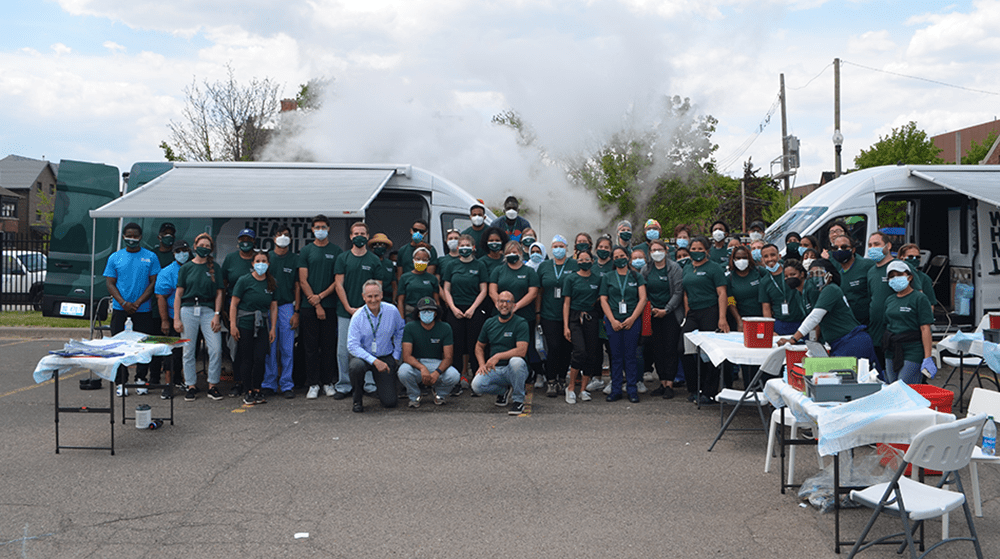The Metro: Wayne Health Mobile Units provide maternal healthcare in low-income neighborhoods
The Metro February 22, 2024A new partnership with Meridian is now allowing the Wayne Health Mobile Units to assist pregnant mothers in Detroit’s low-income neighborhoods.

Wayne Health Mobile Unit team members.
The Wayne Health Mobile Unit launched in 2020 during the beginning stages of the of COVID-19 pandemic. While driving to homes to provide tests and vaccinations, they realized the units could provide many more services.
A new partnership with Meridian is now allowing the Wayne Health Mobile Units to assist pregnant moms in Detroit’s low-income neighborhoods.
Dr. Phillip Levy, associate vice president for Translational Sciences at Wayne State University and the director of the Wayne Health Mobile Unit, joined The Metro to talk about the partnership.
Levy said Black and Brown communities were highly impacted during the pandemic, stemming from underlying health conditions. It’s important to identify and address these to prevent future negative health outcomes.
“Heart disease is the number one cause of death in and around metro Detroit and the country overall. But folks in Detroit are disproportionately impacted by this,” stated Levy. “At the same time, there’s big problems with outcomes in maternal health. And so we started to say we have a great system to bring care into neighborhoods. Let’s push the edge of this and let’s start to think about what we can do for women’s health issues.”
Created by WSU physicians and epidemiologists, the Population Health Outcomes Information Exchange, or PHOENIX, helps visualize clinical and public data for a more targeted response.
“What we can do is add data on maternal outcomes, birth outcomes, and then we get a sense of where the risk is greatest in the communities,” Levy shared.
The program also emphasizes that it’s about a woman’s continued health — not just during the time of the pregnancy.
“What we’re really emphasizing is not just on the pregnancy period, but we got to take care of women across the lifespan. You can’t be a healthy pregnant woman if you’re not a healthy woman before you become pregnant,” Levy said. “Things like chronic hypertension and diabetes dramatically increase the risk of adverse birth outcomes and the risk of death for pregnant women.”
The WSU Mobile Health Unit is able to provide expanded care in partnership with Meridian and the Centene Foundation providing the funding. Healthcare costs and hospital locations are still a major barrier for patients.
“It’s great to write grants and it’s great to get philanthropy. I’ve been doing that my entire life,” Levy said. “But again, if we don’t fundamentally change the way care is delivered so that people can get barrier-free access to services right in their neighborhood — we’re not going to change this equation.”
More headlines from The Metro on Feb. 22, 2024:
- Citizen Robotics and Develop Architecture is cutting the ribbon on Detroit’s first 3D printed home. WDET’s Sam Corey spoke with home architect Bryan Lee Cook.
- Nearly 70 percent of the 1400 scrap yards in Detroit violate city code, and neighbors are not pleased. Stephen Henderson and The Detroit News reporter Sarah Rahal discussed the issue on Created Equal.
- WDET’s Pat Batcheler spoke with Canton Township clerk Michael Siegrist on early in-person primary voting.
- A recent poll says President Joe Biden is trailing four points behind former president Donald Trump in Michigan. Bridge Michigan Deputy Editor Jonathan Oostings talks about Biden’s waning popularity.
Listen to The Metro weekdays from 11 a.m. to 2 p.m. ET on 101.9 FM and streaming on-demand.
Trusted, accurate, up-to-date.
WDET strives to make our journalism accessible to everyone. As a public media institution, we maintain our journalistic integrity through independent support from readers like you. If you value WDET as your source of news, music and conversation, please make a gift today.
